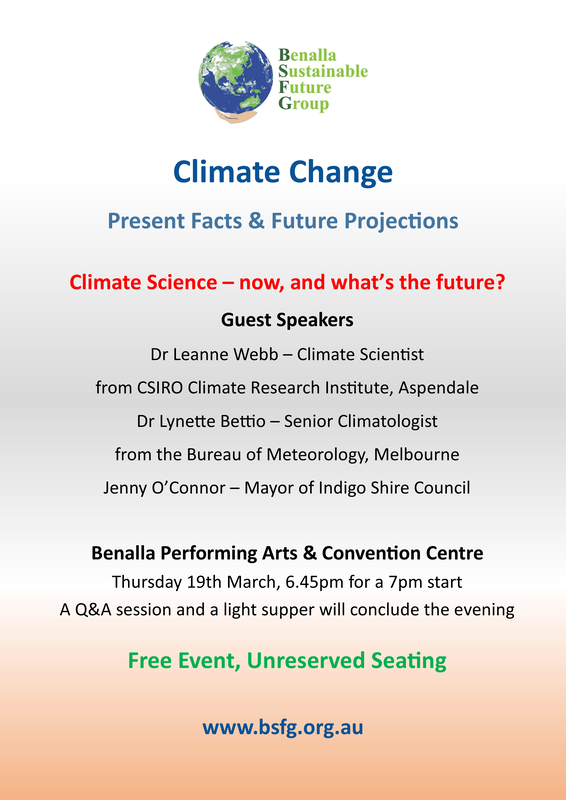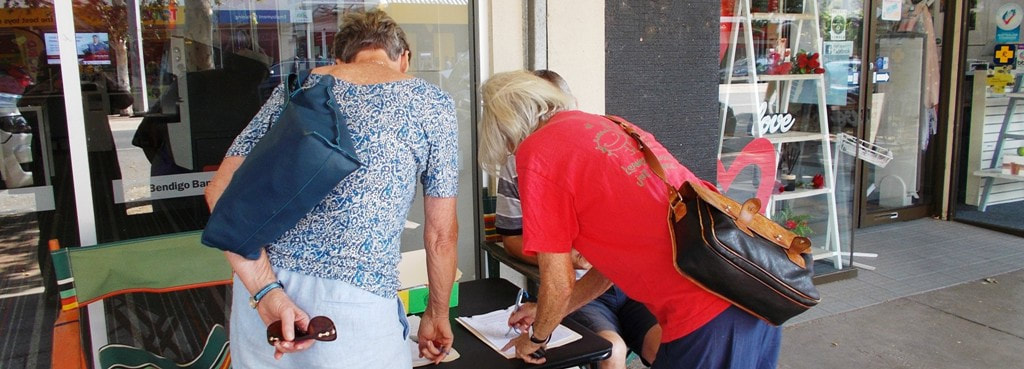National Climate Emergency Summit - Melbourne 14th, 15th Feb 2020
The Melbourne Town Hall was filled to capacity last Friday and Saturday, as 2000 people, representing all age groups, all walks of life, most States of Australia, and across the political spectrum, attended both plenary and workshop sessions, over the two days. Delegates included representatives from Benalla Rural City Council and Benalla Sustainable Future Group
They were addressed by over 100 speakers - climate and other scientists, business leaders, social justice advocates, health professionals, lawyers, engineers, journalists, economists, indigenous leaders, student climate leaders, and politicians - both past and present, Liberal, ALP, Greens and Independents.
The key messages that came through to all delegates at the Summit, were that the World, and in particular developed countries, and most essentially Australia, must urgently tackle the existential threat of climate change, with a government of national unity, and a Cabinet of experts who can utilise all the resources of knowledge and materials that we have to defeat this "enemy of climate change", rather like the free world did to mobilize itself in the world wars.
Why? Because, as the science has been showing us for decades, the Earth has been warming at an increasing rate, principally due to human activity, and it is rapidly approaching critical climate "tipping points", from which it will be impossible to prevent a human and ecological catastrophe.
All speakers were extremely critical of Australia's weak emission reduction target of 26-28% by 2050, describing this as just "kicking the can down the road" for future generations to deal with the problem. The reality is that Australia contributes over 5% of the Earth's greenhouse emissions through its own domestic activities, and its exports of coal and gas overseas - not just the 1.3% claimed by the government. This makes Australia the fourth highest polluting country in the world, with just 25 million of the 7.5 billion people who live on Earth!
Setting targets of zero net emissions by 2050 were also described as hopelessly inadequate - climate scientists warned a few years ago that we have until 2030 at the latest to reach that target.
If the world continues on its present path of burning fossil fuels and releasing even more greenhouse gases into the atmosphere, it will not meet the Paris Climate Agreement objective of limiting warming to 1.5 degrees Celsius, but will instead heat up by 3 to 4 degrees by mid to late this century, making life impossible for billions of people through drought and famine, diseases, rising sea levels, and resulting in the mass extinctions of much of the Earth's flora and fauna.
This is not the future that the 2000 delegates want to see inflicted on our planet. The urgency of the crisis has been demonstrated quite clearly to Australians this summer and in recent years through prolonged drought, catastrophic bushfires, severe hailstorms and flooding rain events - and all of these have been exacerbated by just one degree of warming!
So what solutions did the Summit propose?
Of primary importance, Australia must be a world leader in rapidly restructuring its economy, away from its reliance on fossil fuels, as it is blessed with the natural resources of sun, wind and waves to power its entire economy, and export surplus power to Asia. Communities that currently rely on fossil fuel industries must be financially and socially assisted in this transition. The electricity network grid in Australia requires enormous upgrades to cope with the influx of renewable energy, and part of this upgrade is the installation of large-scale battery storage facilities. The transport sector must be redeveloped with electric or hydrogen-powered vehicles. Agriculture must play its part too, as there are serious ramifications for the Earth if vegetation clearing continues unabated, and soil degradation leads to decreasing food production.
The Summit was told that not only do we need to stop emitting more greenhouse gases into our atmosphere, but we need to draw down carbon dioxide which we have already sent there. Various speakers from science and engineering fields detailed the techniques that are already available, or that could be utilised in the future, in order to do this draw-down, so that the Earth could cool again.
At the final plenary session on Saturday evening, delegates were addressed by 3 speakers. The first was 14 year old schoolboy, Zel Whiting from Adelaide, reporting on the student workshop that had been held during the Summit, at which it was determined to continue fighting for action and justice on behalf of future generations. One could not help but be moved by the clarity of thought, and the desperation of the message that these young people bring to the world. The second speaker was Cr. Trent McCarthy from Darebin City Council in Melbourne, the first Council in the world to declare a Climate Emergency in 2016. Over 100 delegates representing 77 local government jurisdictions in Australia met on Saturday morning, and resolved to "commit to work together as a partisan group" to find solutions to the climate emergency.
The final speaker was Ian Dunlop, former chair of the Australian Coal Association and CEO of the Australian Institute of Company Directors. Mr Dunlop, along with Dr John Hewson (former leader of the Liberal Party), Carmen Lawrence (former WA Premier), Dr Kerryn Phelps (former head of AMA and Independent MHR for Wentworth), and Tim Costello (former CEO of World Vision Australia), co-authored a Declaration of Climate Emergency to the Parliament of Australia, calling for a government of National Unity to tackle the climate crisis, and outlining a course of action that will be required if we are going to save the world from a looming humanitarian and ecological disaster. It is a rallying call to all Australians to confront and overcome the enemy that is climate change.
Peter Holmes
President
The Melbourne Town Hall was filled to capacity last Friday and Saturday, as 2000 people, representing all age groups, all walks of life, most States of Australia, and across the political spectrum, attended both plenary and workshop sessions, over the two days. Delegates included representatives from Benalla Rural City Council and Benalla Sustainable Future Group
They were addressed by over 100 speakers - climate and other scientists, business leaders, social justice advocates, health professionals, lawyers, engineers, journalists, economists, indigenous leaders, student climate leaders, and politicians - both past and present, Liberal, ALP, Greens and Independents.
The key messages that came through to all delegates at the Summit, were that the World, and in particular developed countries, and most essentially Australia, must urgently tackle the existential threat of climate change, with a government of national unity, and a Cabinet of experts who can utilise all the resources of knowledge and materials that we have to defeat this "enemy of climate change", rather like the free world did to mobilize itself in the world wars.
Why? Because, as the science has been showing us for decades, the Earth has been warming at an increasing rate, principally due to human activity, and it is rapidly approaching critical climate "tipping points", from which it will be impossible to prevent a human and ecological catastrophe.
All speakers were extremely critical of Australia's weak emission reduction target of 26-28% by 2050, describing this as just "kicking the can down the road" for future generations to deal with the problem. The reality is that Australia contributes over 5% of the Earth's greenhouse emissions through its own domestic activities, and its exports of coal and gas overseas - not just the 1.3% claimed by the government. This makes Australia the fourth highest polluting country in the world, with just 25 million of the 7.5 billion people who live on Earth!
Setting targets of zero net emissions by 2050 were also described as hopelessly inadequate - climate scientists warned a few years ago that we have until 2030 at the latest to reach that target.
If the world continues on its present path of burning fossil fuels and releasing even more greenhouse gases into the atmosphere, it will not meet the Paris Climate Agreement objective of limiting warming to 1.5 degrees Celsius, but will instead heat up by 3 to 4 degrees by mid to late this century, making life impossible for billions of people through drought and famine, diseases, rising sea levels, and resulting in the mass extinctions of much of the Earth's flora and fauna.
This is not the future that the 2000 delegates want to see inflicted on our planet. The urgency of the crisis has been demonstrated quite clearly to Australians this summer and in recent years through prolonged drought, catastrophic bushfires, severe hailstorms and flooding rain events - and all of these have been exacerbated by just one degree of warming!
So what solutions did the Summit propose?
Of primary importance, Australia must be a world leader in rapidly restructuring its economy, away from its reliance on fossil fuels, as it is blessed with the natural resources of sun, wind and waves to power its entire economy, and export surplus power to Asia. Communities that currently rely on fossil fuel industries must be financially and socially assisted in this transition. The electricity network grid in Australia requires enormous upgrades to cope with the influx of renewable energy, and part of this upgrade is the installation of large-scale battery storage facilities. The transport sector must be redeveloped with electric or hydrogen-powered vehicles. Agriculture must play its part too, as there are serious ramifications for the Earth if vegetation clearing continues unabated, and soil degradation leads to decreasing food production.
The Summit was told that not only do we need to stop emitting more greenhouse gases into our atmosphere, but we need to draw down carbon dioxide which we have already sent there. Various speakers from science and engineering fields detailed the techniques that are already available, or that could be utilised in the future, in order to do this draw-down, so that the Earth could cool again.
At the final plenary session on Saturday evening, delegates were addressed by 3 speakers. The first was 14 year old schoolboy, Zel Whiting from Adelaide, reporting on the student workshop that had been held during the Summit, at which it was determined to continue fighting for action and justice on behalf of future generations. One could not help but be moved by the clarity of thought, and the desperation of the message that these young people bring to the world. The second speaker was Cr. Trent McCarthy from Darebin City Council in Melbourne, the first Council in the world to declare a Climate Emergency in 2016. Over 100 delegates representing 77 local government jurisdictions in Australia met on Saturday morning, and resolved to "commit to work together as a partisan group" to find solutions to the climate emergency.
The final speaker was Ian Dunlop, former chair of the Australian Coal Association and CEO of the Australian Institute of Company Directors. Mr Dunlop, along with Dr John Hewson (former leader of the Liberal Party), Carmen Lawrence (former WA Premier), Dr Kerryn Phelps (former head of AMA and Independent MHR for Wentworth), and Tim Costello (former CEO of World Vision Australia), co-authored a Declaration of Climate Emergency to the Parliament of Australia, calling for a government of National Unity to tackle the climate crisis, and outlining a course of action that will be required if we are going to save the world from a looming humanitarian and ecological disaster. It is a rallying call to all Australians to confront and overcome the enemy that is climate change.
Peter Holmes
President








